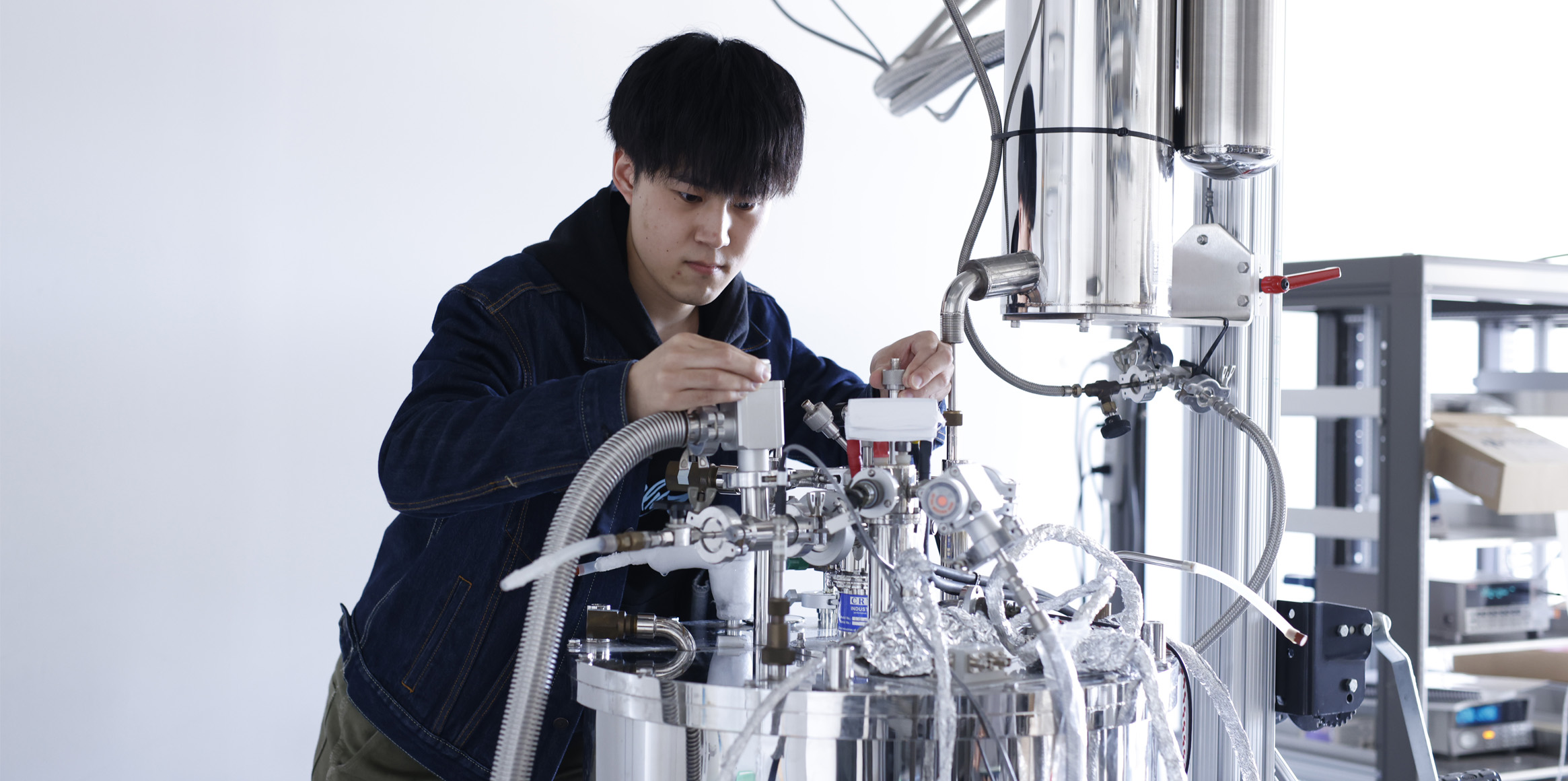In order to realize a rich and sustainable society, technological innovation is necessary. The Department of Applied Physics carries out research and education to innovate new materials and devices.
Through systematic basic teaching on materials and substances, as well as applied research covering a wide range of fields including advanced measurement, the Department aims to educate professionals who can truly contribute to society while possessing “solid basic skills and the ability to apply them”.
Research Groups & Research Areas
-
Materials Science
We study the behavior of electrons in matter and other properties of matter revealed by quantum mechanics, one of the foundations of modern physics, in order to discover physical properties which have not previously existed and to develop material functionality. Our current way of life is made possible by physical materials which have a variety of properties. By developing physical materials with novel functions, we open up new possibilities for our future way of life.
Itou Research Group / Miyajima Research Group / Saitoh Research Group / Tohyama Research Group
-
Complexity Science
This field of study adopts a nonlinear dynamical systems perspective to derive a mathematical understanding of emergent phenomena, such as human brain activity, fish shoaling, and earthquake generation mechanisms, which are the result of a combination of factors. Researcher in complexity science is focused on such topics as the mechanisms of information transmission to the brain and analysis of human social networks where individuals are connected via a diverse array of relationships.
Araki Research Group / Aso Research Group / Sumino Research Group
-
Energy Science
Understanding energy storage, transport and conversion from a physical perspective and then generating novel applications based on this understanding is an important challenge for realizing a sustainable future. We are pursuing new energy development in such areas as “high temperature superconductivity,” which is central to quantum computing, and “energy harvesting,” which involves converting ambient vibration and heat into electrical energy.
Miyakawa Research Group / Nakajima Research Group
-
Nanodevices
When electrons and molecules, ions and other minute particles are placed in nanospaces or nanoperiodic structures, quantum mechanical effects become apparent. In the field of nanodevices, we focus on spatial design at the atomic and molecular level in order to pursue the research and development of superior power-saving, ultra-small-scale, high-performance, next-generation memory, energy elements, and ultra-small devices with novel functions.
Higuchi Research Group / Kinoshita Research Group / Okamura Research Group
List of Faculty Members
| Name | Title | Research Area | Keyword |
|---|---|---|---|
| ARAKI Osamu | Professor | Neurophysiology/General neuroscience | Neural Information Processing, Cognitive Neuroscience, EEG, Neurodynamics |
| HIGUCHI Tohru | Professor | Thin film/Surface and interfacial physical properties Inorganic industrial materials |
Oxide Material Science Solid State Ionics |
| ITOU Tetsuaki | Professor | Condensed matter physics II | Magnetism, Superconductivity, Highly Correlated Electron System |
| KINOSHITA Kentaro | Professor | Biological physics/Chemical physics/Soft matter physics | device physics, composite material, AI devices |
| MIYAJIMA Kensuke | Professor | Condensed matter physics I | Optical Properties, Semiconductor Nanocrystals, Laser Spectroscopy |
| MIYAKAWA Nobuaki | Professor | Condensed matter physics II | Superconductivity, Transparent conductive oxide, Crystal growth, Transport properties |
| NAKAJIMA Takashi | Professor | Polymer/Textile materials | Electric Properties of Polymer |
| SAITOH Tomohiko | Professor | Condensed matter physics II | Electronic structure, photoemission spectroscopy, strongly correlated electron systems |
| SUMINO Yutaka | Professor | Nano/Microsystems General applied physics Mathematical physics/Fundamental condensed matter physics Biological physics/Chemical physics/Soft matter physics Functional solid state chemistry |
collective micro robotics micro machine Pattern formation, disspative structure nonequilibrium softmatter colloid, surfactant, wetting |
| TOHYAMA Takami | Professor | Condensed matter physics II | Strongly Correlated Electron Systems |
| GOTO Minori | Associate Professor | ||
| ASO Naofumi | Junior Associate Professor | Solid earth and planetary physics | Earthquake physics |
| YAMADA Tsunetomo | Junior Associate Professor | Physical properties of metals/Metal-base materials | Quasicrystals |
| ISHIGAKI Kento | Assistant Professor | Condensed matter physics II | Storngly Correlated Electron System,Magnetism, Superconductivity, Layered compounds |
| KOBAYASHI Junei | Assistant Professor | Nanostructural physics Condensed matter physics I |
Carbon nanotubes, Low-dimensional materials Thermoelectric conversion |
| KOUCHI Takayoshi | Assistant Professor | Condensed matter physics II | Strongly correlated electron systems, magnetism, superconductivity |
| OKUGAWA Ryo | Assistant Professor | Condensed matter physics I | Topological phases |
| YANAGISAWA Ryoto | Assistant Professor | Nanostructural physics | Phonon engineering, Thermoelectrics |
| YOSHII Kiwamu | Assistant Professor | ||
| ZHENG Yumeng | Assistant Professor | Electronic materials/Electric materials | ReRAM, ZnO varistor, interface states |
Information on Career Paths
※The data is for Faculty of Science Division I Department of Applied Physics gratext-align: center;duates.
-
Graduate School76.8%
-
Information Industry7.2%
-
Professional and Technical Services3.2%
-
Machinery and Appliances2.1%
-
Electronic Parts2.1%
-
Real Estate and Goods Rental and Leasing1.1%
-
Steel and Metal Mining1.1%
-
Electricity, Gas, Heat Supply and Water1.1%
-
Finance, Insurance1.1%
-
Other(Persons Planning on Continuing Education, Studying Abroad, etc.)4.2%

